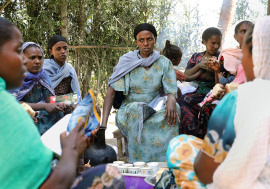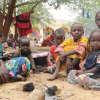Through her work at the Tanzania Media Women’s Association in Zanzibar, Mzuri Issa is at the forefront of pushing for legal reforms and changing policies and attitudes that impede women’s access to leadership and decision-making. Her tough childhood experiences motivate her to advocate for the rights of women and girls, using the media.
“Growing up, I faced a lot of rejection,” says Mzuri Issa, head of the Tanzania Media Women’s Association in Zanzibar (TAMWA-Zanzibar). “My mother didn’t have the means to raise me, and I spent most of my childhood moving from one home to another.”
“I became an adult very fast. At the age of 11, I was working at a fast-food kiosk just so I had something to eat every day. I witnessed countless forms of discrimination and abuse against women, including my own mother,” she adds.
Ms. Issa says that she learned valuable lessons about life from those early years, which motivated her to complete her education and establish the Zanzibar branch of TAMWA, in 2004.
She had just begun her career as a journalist in the early 90s, when she learned about a law that discriminated against women and girls who got pregnant out of wedlock. The penalty could include a prison sentence for the pregnant woman.
Ms. Issa reported on the issue for years, and worked alongside media partners and activists, calling for the review of the law. The law was finally changed in 2005.
Challenging discriminatory norms and changing mindsets
With funding and technical support from UN Women, TAMWA-Zanzibar has been working with religious leaders and grass-roots communities since 2010, to change cultural norms, attitudes and practices that create barriers to women’s empowerment – including their access to leadership and decision-making positions.
I work in advocacy to change perceptions that lead to discrimination against women and [to uplift] women’s status in society.
For instance, women in Zanzibar are more likely to be unemployed and earn lower incomes, and patriarchal systems entrenched in Zanzibar’s culture constitute barriers to accessing decision-making roles within their homes, in their communities and within the institutions that serve as gatekeepers, such as political parties.
“Unfortunately, many still believe women cannot and should not be leaders, particularly in politics, and they base these beliefs on religion. But the leadership of women is evident in both the Qur’an and the Bible,” says Ms. Issa.
Ms. Issa is also at the forefront of pushing for legal reforms that will ensure women compete effectively for leadership positions on an equal standing with men, and for perpetrators of violence against women to be held accountable.
She is specifically advocating to increase rape prison sentences to 30 years.
“I work in advocacy to change perceptions that lead to discrimination against women and [to uplift] women’s status in society,” she says. “My work is really fulfilling.”
In 2020, the organization worked with a team of 46 male change agents and over 70 religious leaders, to promote women’s leadership by raising public awareness.
About 590 community members within eight districts of the Zanzibar islands of Unguja and Pemba were reached.
TAMWA also works closely with the mainstream media, sensitizing them on gender-responsive reporting, ensuring women are key news sources, well-represented in diverse roles, and jointly producing content, instead of being portrayed only as victims.
In 2020, TAMWA trained over 50 journalists, and provided longer-term mentoring to ensure that they produced content promoting women’s leadership.
As a result, over 263 news stories and features promoted women’s leadership and meaningful participation in decision-making in the period leading up to, and immediately after, the general elections in October last year.
Because of TAMWA-Zanzibar’s work, Issa believes that more women were visible in leadership roles, thus inspiring women to run for elections.
“A total of 162 women won nominations within their parties and ran for election in the Zanzibar House of Representatives (ZHoR) and councils,” says Ms. Issa. “Of the 435 women who expressed interest to contest at various levels, five women ran for the presidency, a first for Zanzibar.”
Women currently make up 40.8 per cent of the House of Representatives, a 3 per cent increase from the previous five-year term, and almost double the average proportion of women in parliament in Sub-Saharan Africa (24.4 per cent).
To make even greater progress, Issa says increasing the number of women working within the media is critical. “Because the media serves as a mirror to society, we need more women working in media houses to accurately represent women’s lived experiences.”
“Better representation will help stop the perpetuation of negative stereotypes, and give women the voice and platform they deserve.”
Forging ahead with “Wanawake Wanaweza” (Women Can)
TAMWA-Zanzibar’s community outreach and media advocacy falls under UN Women’s flagship Women’s Leadership and Political Participation programme, “Wanawake Wanaweza” (Women Can), funded by the governments of Finland, Sweden, Switzerland and the United States.
Since 2014, the programme has been working to address challenges that women face in accessing leadership and decision-making roles across Tanzania, by identifying the gaps in legal and policy frameworks, building the capacity of aspiring and current women leaders, and supporting institutional change to create enabling environment for women to take up decision-making roles.
This year, UN Women plans to continue working with TAMWA-Zanzibar to expand its reach to other districts, and focus on engaging male allies and building leadership skills of young women, including those with disabilities.
Fast facts
- Social norms, and cultural and attitudinal barriers reinforce perceptions that men make better leaders than women. Thirty-six per cent of people surveyed globally between 2017 and 2020 still considered that men make better politicians than women.
- Gender quotas increase women’s representation in legislatures and other sectors when they are well designed and effectively implemented. Change necessitates public support and political will of male leaders to publicly promote gender equality and women’s participation in areas of public life.
- The media, advertising, film, and television industries can help reverse discrimination in how women leaders are portrayed, and governments should fund and support public information campaigns with positive messages and images of women to change stereotypes.
- Globally, ethnic minorities, women migrants, women in rural areas, women with disabilities and indigenous women continue to face discrimination and exclusion from public life. Violence against women in political and public life continues to restrict women’s access to power and decision-making. More needs to be done to ensure that all public institutions apply zero tolerance for violence, discrimination and abuse.
Links:














